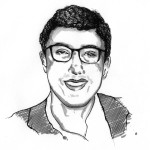My faith teaches me that I can be a saint, if I will it. It teaches that you can be a saint, too. But that’s a hard thing to believe.
 It’s easy to doubt our own potential to be heroic. There’s a saying by Nathaniel Hawthorne that goes, “A hero cannot be a hero unless in a heroic world.” I wonder if he’s right. And if so, does my doubt come from living in a decidedly nonheroic world?
It’s easy to doubt our own potential to be heroic. There’s a saying by Nathaniel Hawthorne that goes, “A hero cannot be a hero unless in a heroic world.” I wonder if he’s right. And if so, does my doubt come from living in a decidedly nonheroic world?
If you’re getting ready to call my bluff, don’t worry. I’ll do it. This isn’t going to rapidly devolve into a tired, conservative philippic against the failure of the modern age and a clarion call to return to classical virtue. Actually, heroes are everywhere today. They’re starting nonprofits for forgotten causes, abandoning their livelihoods for dangerous projects overseas and they’re proving themselves every day on the battlefield in our armed forces. I remember being little and hearing about the man who jumped in front of a moving subway train to save a rider who had fallen onto the tracks. These aren’t random acts — people of faith and of science (and quite a few of both) will tell you that an inclination towards heroism is programmed into our minds, and it’s not going away.
But Hawthorne’s observation isn’t entirely wrong: We live in a time that doesn’t make heroism readily accessible. The generations that came before us in the 20th century all had inescapable tests — of strength, of character — that they knew they would have to confront. We know about them through family stories and great novels. The characters who grappled with questions of faith, identity and loyalty against the backdrop of the world wars became the stuff of legends. After them came the Vietnam War and the social movements of the ’60s and ’70s, with their moral demands of young people on and off the battlefield. Those who acted with courage and bravery were noted, honored and remembered. People were asked to take stands in trying times, and they did.
The modern “rebel without a cause” wants to be as extraordinary, but it’s not nearly as clear how.
We don’t need war to summon our creative, or heroic, attributes. Opportunities are everywhere: in community service, in our families and especially in our friendships, where just loving unconditionally can be a heroic act in a world where expressing brokenness is awkward and taboo. A lesser-known Hawthorne expression goes, “The greatest obstacle to being heroic is the doubt whether one may not be going to prove one’s self a fool; the truest heroism is to resist the doubt.” He’s on point. One of my best friends at Yale — she’s since graduated and joined the Marines — heard about a distant friend of a friend in a bad place in life and drove, that very same night, hundreds of miles to help. I was flabbergasted when I heard. While I was still reeling, she was already driving.
Our culture isn’t set up in a way that engenders heroic thinking. Heroism is driven chiefly by a sense of duty, a reactionary feeling that we have an obligation toward someone in need. Members of our generation structure our lives around choices, not duties. Take Yale life. It starts with the little things, like how we talk about the projects and activities we devote our time to. “What I’m most interested in is …” or “I really could not care less about …” are some of the operative phrases we’ve all used. That Yale gives us so many choices is a testament to how lucky we are to be here. But that so many activities we do are based on our own free choice, and that we stick around only because we want to, is a sign of a problem.
It translates into relationships with people, too. It’s easy to get a meal with a friend you see once every few months. It’s a staple of life at Yale. But it’s much harder to really invest time in getting to know someone and watching their personality unfold in different settings over the course of years. To see friends in the context of a single conversation is important, but what’s more important is to see their loyalty tested in trying situations. In a world centered on options, opportunities to show true character don’t occur frequently.
No, we don’t need a war to understand that we should cultivate loyalty, duty and depth in our relations with the people and the projects we are close to. Heroism, if we still want it, demands a sense of obligation toward others. But do we want heroism? Is our apathetic, if peaceful lull worth it, if it comes at the cost of losing the virtues that make life worth living? But more fundamentally: Do we want to be more than simply what we want to be?
John Aroutiounian is a junior in Jonathan Edwards College. His column runs on alternate Mondays. Contact him at john.aroutiounian@yale.edu.







